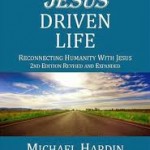 Today we have part 2 of a 4-part series by Michael Hardin, “How Jesus Read His Bible.” Hardin (see full bio at part 1) is the co-founder and Executive Director of Preaching Peace a non-profit based in Lancaster, PA whose motto is “Educating the Church in Jesus’ Vision of Peace.” Hardin has published over a dozen articles on the mimetic theory of René Girard in addition to essays on theology, spirituality, and practical theology. He is also the author of several books, including the acclaimed The Jesus Driven Life
Today we have part 2 of a 4-part series by Michael Hardin, “How Jesus Read His Bible.” Hardin (see full bio at part 1) is the co-founder and Executive Director of Preaching Peace a non-profit based in Lancaster, PA whose motto is “Educating the Church in Jesus’ Vision of Peace.” Hardin has published over a dozen articles on the mimetic theory of René Girard in addition to essays on theology, spirituality, and practical theology. He is also the author of several books, including the acclaimed The Jesus Driven Life from which these posts are adapted.
In today’s post, Hardin continues his discussion of Luke 4 and and how Jesus’s use of Isaiah 61:1-2 reframes our understanding of “wrath” and the retributive violence of God.
**********************
When teaching Luke 4, I point out that Isaiah 61:1-2 was one of the more popular passages in Judaism. It is cited in the Dead Sea Scrolls and other writings as well as in rabbinic literature. Have you ever seen a football game where after a touchdown somebody holds up a sign in the end zone seats that reads “John 3:16?” If they had played football in Jesus’ day that sign would have read “Isaiah 61:1-2.”
What made it so important was that it was a lectionary passage for the Year of Jubilee. This was a text that expressed the hope of Israel for liberation from the bondage not only of spiritual dis-ease but also political and economic oppression. The vision of Isaiah was one of shalom, wholeness in all of life.
The first thing to notice is that Jesus does not cite the entire text but eliminates one very important line, “and the day of the vengeance of our God.” The question is: why did he do this?
Some suggest that now is the time of grace and so Jesus holds off on quoting the text about God’s vengeance since that will come later at the end of time. But nowhere else does Jesus seem to quote the biblical text in this fashion, and he never seems to break the work of God into dispensations or periods of time. Something else is going on here.
Second is the problem of translation that arises in Luke 4:22. Most translations indicate that the crowd was pleased with Jesus. These same synagogue hearers then comment, “Isn’t this Joseph’s son?”
 The intonation we are supposed to supply would be something like “Oh, what a fine sermon and what a fine preacher Jesus has turned out to be, his father would be so proud!” But is this the case?
The intonation we are supposed to supply would be something like “Oh, what a fine sermon and what a fine preacher Jesus has turned out to be, his father would be so proud!” But is this the case?
The Greek text is quite simple and the King James has adequately translated this “and all bore witness to him.” This bearing witness in the KJV is neither positive nor negative. Why then do translators say, “all spoke well of him?”
Translators have to make what is known as a syntactical decision, they have to decide whether or not the “bearing witness” is negative or positive. Technically speaking they have to decide if the dative pronoun “to him” is a dative of disadvantage or a dative of advantage; was the crowd bearing witness to his advantage or to his disadvantage?
If it is the former case then the intonation we gave to “Isn’t this Joseph’s son?” above would make sense and Jesus immediately following gets sarcastic for no reason, but if it is the latter then we could just as well translate this text as “and all spoke ill of his sermon,” that is, they didn’t like what he said.
Then the intonation of the phrase “Isn’t this Joseph’s son?” should be rendered something like “who does Jesus think he is coming into our synagogue and saying such things?” With this alternate, preferable translation, of verse 23 Jesus is not being sarcastic but is responding to the negativity of the listeners.
A third point to be made concerns the two examples Jesus cites from two of Israel’s greatest prophets, Elijah and Elisha. In both cases Jesus notes that God worked not within the bounds of Israel but outside the chosen people when he sent these prophets to feed and heal.
What is the connection between what these prophets did and what Jesus said when he quoted the Isaiah text, and why did the crowd get angry enough with him to want to kill him?
We noted that when Jesus quoted the Isaiah text he did not quote the phrase “and the day of the vengeance of our God.” If, in popular opinion, part of the promise of jubilee was that God would deliver Israel from her oppressors, and if that expectation was that God would punish her oppressors, then the phrase “and the day of the vengeance of our God” would be an aspect of the longed for and hoped for deliverance by which Israel’s enemies would be cast down.
Political deliverance was perceived as an aspect of God working wrath on Israel’s enemies. By eliminating this line, Jesus also eliminated the possibility that jubilee included God’s wrath upon whoever was oppressing Israel. His words were indeed “gracious words” (“words of grace”).
The citation of the two examples of Elijah and Elisha then justify Jesus’ exclusion of this vengeance saying, for both prophets had worked their healing miracles among foreign outsiders, those whom God was supposed (in popular piety) to hate.
In short, Jesus is saying to his synagogue hearers
Jubilee is here, not only for you but also for those you hate; in fact God also goes to your oppressors with this message of jubilee, deliverance and salvation. God will become their God and thus you shall all be family.
Now we can begin to understand why they got so mad at him.
But there is a further implication to be drawn from this. By eliminating the phrase regarding God’s vengeance, Jesus is removing the notion of  retributive violence from the doctrine of God.
retributive violence from the doctrine of God.
He is in effect saying that God is not like you think, loving you and angry with those you hate. There is a great bumper sticker making the rounds these days that captures this problem. It says “Isn’t it convenient that God hates the same people you do?”
Like the Galileans, we too have a tendency to want to believe that God is on our side and will judge “the other” who is over against us, or different from us. Such was not the case with Jesus. He observed that God makes no distinctions between righteous and wicked, between oppressors and oppressed, they both need deliverance and God’s blessing. Did he not say, “God makes rain to fall on good and evil and sun to shine on just and unjust?” (Matt 5:45)
This is perhaps the most important point I am seeking to make in my book The Jesus Driven Life, namely that, like Jesus, it is essential for us to begin to reframe the way we understand the “wrath” or retributive violence of God.
To suggest that God is nonviolent or better yet, that God is not involved in the cycle of retributive vengeance and punishment will undoubtedly strike many as wrong. Some having read this far are no doubt ready to run me out of town. If you are feeling this way, then what is the difference between how you feel and how Jesus’ hearers felt that day when he preached in his hometown synagogue?
Nothing irks some folks more than losing a God who is wrathful, angry, retributive and punishing. This is only because we want so much to believe that God takes sides, and that side is inevitably our side.
















